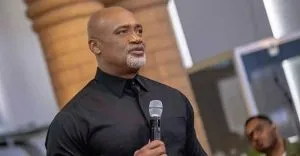VeryDarkMan Spends Third Day in EFCC Custody Amid Controversy

Martins Vincent Otse, widely known as VeryDarkMan (VDM), a prominent Nigerian social media influencer and activist, remains in the custody of the Economic and Financial Crimes Commission (EFCC) for the third consecutive day. His detention, which began on May 2, 2025, has sparked widespread debate, with supporters rallying for his release and critics demanding accountability for his controversial online activities. The circumstances surrounding his arrest, coupled with allegations of excessive force and unclear charges, have intensified public scrutiny of the EFCC’s actions.
The Arrest: A Dramatic Scene at GTB
VDM was apprehended at a Guaranty Trust Bank (GTB) branch in Garki, Area 3, Abuja, alongside his friend Steven Avuara, also known as C-Pack. According to VDM’s legal team, led by activist lawyer Deji Adeyanju, the arrest was marked by excessive force and procedural irregularities. The lawyers claim that EFCC operatives beat VDM and Avuara, blindfolded them, and trapped them in a security door at the bank for over five minutes before whisking them away to an undisclosed location. The warrant for VDM’s arrest, issued by Chief Magistrate Njideka Iloanya-Duru, cites cyberstalking as the primary offense, though specific details of the allegations remain undisclosed.
Adeyanju has accused the EFCC of failing to communicate the precise reasons for VDM’s detention, arguing that the agency lacks the authority to arrest or charge individuals for defamation-related offenses like cyberstalking. He further alleged that GTB colluded with the EFCC by facilitating the arrest on its premises, prompting plans to sue the bank for violating VDM’s rights. “The EFCC’s actions are a clear overreach,” Adeyanju stated in a press release. “We demand transparency and respect for our client’s constitutional protections.”
Public Reaction: A Polarized Response
VDM’s detention has ignited a firestorm of reactions across Nigeria, particularly on social media platforms like X, where the hashtag #FreeVDM has gained significant traction. Supporters, including high-profile figures such as musician Davido and politician Peter Obi, have condemned the arrest as an attempt to silence VDM’s outspoken criticism of corruption and societal issues. Davido, in a post on X, described the detention as “unlawful” and called for VDM’s immediate release, while Obi labeled it “an attack on free speech.”
Conversely, not all reactions have been sympathetic. Smanuel Jemitalo, a Nigerian who claims to have been targeted by VDM’s online activism, publicly urged the EFCC to keep VDM in custody for at least seven days. In a widely circulated video, Jemitalo accused VDM of “sentimental activism” and cyberbullying, specifically referencing VDM’s alleged mistreatment of Wunmi, the widow of the late singer Mohbad. Jemitalo’s stance has fueled a counter-narrative, with some arguing that VDM’s provocative style and unverified claims have caused harm, warranting accountability.
VDM’s Stance in Custody
Reports indicate that VDM has taken a defiant posture while in EFCC custody. According to sources close to his legal team, the influencer has refused to leave his cell or meet with visitors, including his lawyers, as a form of protest against his detention. This move has further amplified his supporters’ claims that he is being unfairly targeted for his activism, which often involves exposing alleged corruption and calling out public figures.
VDM, known for his bold and unfiltered commentary, has amassed a large following for his advocacy on issues ranging from police misconduct to corporate malfeasance. However, his methods—often involving public shaming and unverified allegations—have also made him a polarizing figure, attracting both ardent defenders and vocal detractors.
Legal and Constitutional Questions
The EFCC’s handling of VDM’s case has raised significant legal and constitutional concerns. Under Nigerian law, the EFCC’s mandate is primarily focused on investigating and prosecuting financial crimes, such as money laundering and fraud. Critics argue that cyberstalking, as cited in the arrest warrant, falls outside the agency’s jurisdiction, particularly since defamation is not a federal offense in Nigeria. Adeyanju has vowed to challenge the legality of the arrest, asserting that it violates VDM’s rights to free expression and due process.
Additionally, the lack of transparency regarding the specific allegations against VDM has fueled speculation that his detention may be linked to his recent exposés or conflicts with powerful individuals. In the weeks leading up to his arrest, VDM had been vocal about several high-profile issues, though no direct connection to his detention has been confirmed.
The Broader Context
VDM’s case underscores ongoing tensions between Nigeria’s anti-corruption agencies and activists who leverage social media to demand accountability. While the EFCC has been praised for its efforts to combat financial crimes, it has also faced accusations of selective enforcement and targeting critics of the government or influential figures. VDM’s detention is the latest in a series of incidents that have raised questions about the balance between regulating online behavior and protecting free speech.
As of May 5, 2025, the EFCC has yet to issue an official statement clarifying the reasons for VDM’s detention or outlining the next steps in the investigation. This silence has only deepened public skepticism, with many calling for greater accountability from the agency.
What’s Next?
With VDM still in custody and no confirmed release date, his legal team is preparing to escalate the matter. In addition to suing GTB, Adeyanju has indicated plans to file a fundamental rights suit against the EFCC, seeking redress for what he describes as “gross violations” of VDM’s liberties. Meanwhile, VDM’s supporters continue to mobilize online and offline, with protests reportedly being planned in Abuja.
The outcome of this case could have far-reaching implications for Nigeria’s digital activism landscape, particularly for influencers like VDM who operate at the intersection of free speech and public accountability. For now, the nation watches closely as the saga unfolds, with VDM’s fate hanging in the balance.





